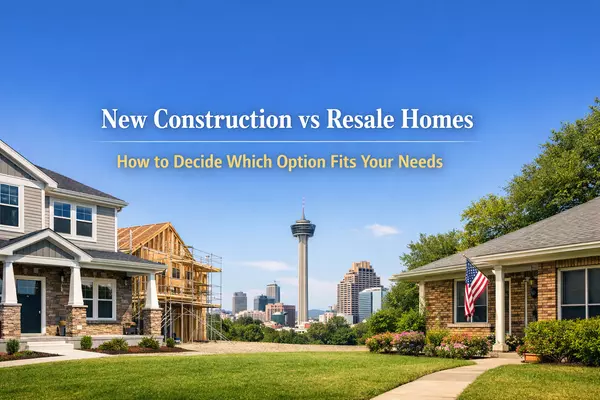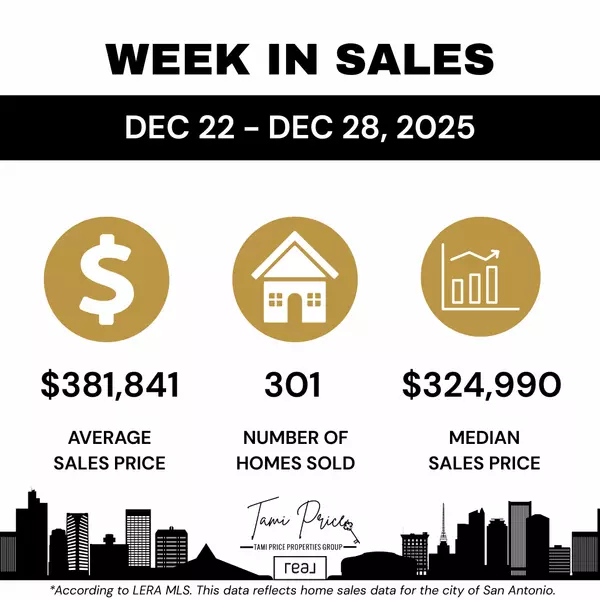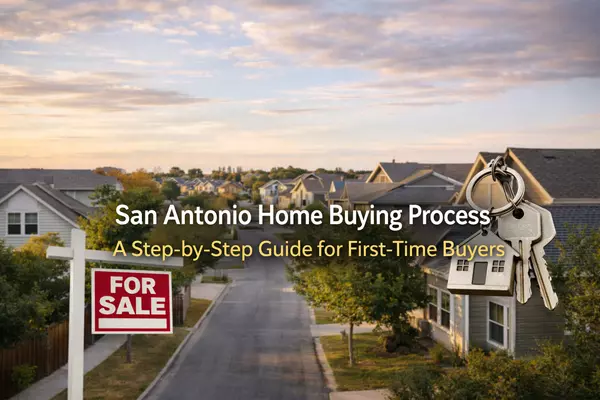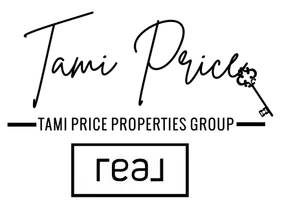New Construction vs Resale Homes in San Antonio: How to Decide Which Option Fits Your Needs

San Antonio buyers searching for their next home face a fundamental choice early in the process: pursue new construction or focus on resale properties. Each path offers distinct advantages, and understanding the differences helps buyers make decisions aligned with their priorities, timeline, and budget.
The San Antonio market features robust activity in both segments. National and regional builders develop communities throughout the metropolitan area, while established neighborhoods offer resale inventory ranging from historic homes to properties just a few years old. This diversity gives buyers genuine options, but it also requires thoughtful evaluation to determine which direction makes the most sense.
This guide examines the key differences between new construction and resale homes, helping San Antonio buyers understand what each option provides and which factors should drive their decision.
What Defines New Construction vs Resale Properties?
Before comparing the two options, understanding what each category encompasses helps frame the discussion.
New Construction Categories:
- To be built homes where buyers select lots and customize from builder plans
- Homes under construction at various stages of completion
- Inventory or spec homes completed by builders and available for immediate purchase
- Quick move in homes nearing completion with some customization still possible
- Model homes occasionally sold by builders transitioning communities
Resale Property Categories:
- Recently built homes just a few years old with modern features
- Established homes from the past decade with contemporary floor plans
- Older homes with character, larger lots, or established landscaping
- Historic properties with architectural significance
- Properties requiring updates or renovation
Both new construction and resale encompass wide ranges of price points, locations, and conditions. Generalizations about either category require context about specific properties and circumstances.
What Are the Primary Advantages of New Construction?
Buyers drawn to new construction typically value specific benefits that newer properties provide.
Modern Floor Plans and Features:
New construction reflects current lifestyle preferences. Open concept layouts, larger master suites, mudrooms, home offices, and indoor outdoor living connections address how families live today. Builders incorporate trends and buyer feedback into evolving floor plan designs.
Features commonly found in new construction:
- Open kitchens flowing into family living spaces
- Larger closets and storage solutions
- Dedicated laundry rooms on upper floors near bedrooms
- Outdoor living areas designed for entertaining
- Smart home wiring and technology integration
- Energy efficient windows, insulation, and HVAC systems
Current Building Codes and Standards:
Homes built to current codes incorporate the latest requirements for structural integrity, electrical systems, plumbing, and energy efficiency. These standards evolve over time, meaning newer homes often exceed the specifications of older construction.
Energy efficiency improvements translate to lower utility costs. Better insulation, high efficiency HVAC systems, and modern windows reduce heating and cooling expenses compared to older homes.
Builder Warranties:
New construction comes with warranty coverage that provides protection against defects. While warranty terms vary by builder, coverage typically includes:
- One year coverage for workmanship and materials
- Two years for mechanical systems like plumbing, electrical, and HVAC
- Ten years for structural components
Understanding builder warranties helps buyers know what protection they receive and how to address issues that arise.
Personalization Opportunities:
Buyers who purchase before construction begins can often select finishes, fixtures, and upgrades. Choosing flooring, countertops, cabinet styles, and paint colors allows buyers to move into homes reflecting their personal taste without immediate renovation.
The extent of customization varies by builder, price point, and timing. Inventory homes offer less flexibility than to be built purchases, though some modifications may still be possible.
What Are the Primary Advantages of Resale Homes?
Resale properties offer different benefits that appeal to many buyers.
Established Neighborhoods:
Resale homes sit in neighborhoods with known characteristics. Buyers can evaluate the community's actual condition, observe neighbor maintenance standards, and experience the neighborhood before committing. Mature landscaping provides shade, privacy, and curb appeal that new construction cannot immediately offer.
Neighborhood amenities like parks, trails, and community facilities are complete and functioning. Buyers know exactly what exists rather than relying on builder promises about future development.
Larger Lots and Unique Features:
Older homes often occupy larger lots than new construction, where builders maximize density to manage land costs. Buyers seeking substantial outdoor space may find better options in established neighborhoods.
Architectural variety and character distinguish many resale homes. Custom built properties, unique floor plans, and period details provide personality that production builders rarely replicate.
Faster Timelines:
Resale purchases can close within 30 to 45 days, allowing buyers to take possession quickly. New construction timelines range from several weeks for completed inventory to six months or longer for to be built homes.
Buyers with time constraints, such as lease expirations or PCS move deadlines, often find resale properties more practical than new construction.
Negotiation Flexibility:
Individual sellers often demonstrate more flexibility than builders on price and terms. While builders may offer incentives, base prices typically remain firm. Resale sellers facing personal circumstances like job relocations, divorces, or estate settlements may accept offers below asking price.
Negotiations can address not only price but also closing costs, repairs, personal property inclusion, and closing timelines. This flexibility allows buyers to structure purchases fitting their specific needs.
How Do Costs Compare Between New Construction and Resale?
Understanding cost differences helps buyers evaluate which option provides better value for their circumstances.
Purchase Price Considerations:
New construction per square foot costs often exceed comparable resale properties, reflecting current material and labor costs, builder margins, and modern features. However, direct price comparisons require evaluating what each property includes.
Factors affecting price comparisons:
- Square footage and floor plan efficiency
- Lot size and location within developments
- Included features and upgrade levels
- Community amenities and HOA structures
- Age and condition of resale properties
Closing Cost Differences:
Builder incentives frequently include closing cost contributions or preferred lender credits that reduce buyer expenses. Some builders offer packages covering title fees, prepaid items, or rate buydowns.
Resale transactions may also include seller contributions toward closing costs, though negotiation determines these terms. Neither option inherently provides lower closing costs without evaluating specific circumstances.
Immediate and Near Term Expenses:
New construction typically requires minimal immediate investment beyond window coverings and landscaping. Move in ready condition means no urgent repairs or updates.
Resale homes may need immediate attention depending on age and condition. Deferred maintenance, dated systems, or cosmetic updates can add significant expense beyond the purchase price. Home inspections reveal conditions requiring attention.
Long Term Cost Considerations:
Newer homes generally require less maintenance in early years due to new systems and components. Warranty coverage addresses defects during initial ownership.
Older homes may require system replacements sooner. Roofs, HVAC systems, water heaters, and appliances have limited lifespans. Buyers should evaluate the remaining useful life of major components when considering resale properties.
What Timeline Differences Should Buyers Expect?
The path from beginning the search to moving in differs significantly between options.
New Construction Timelines:
- Inventory homes: 30 to 60 days, similar to resale closings
- Quick move in homes: 45 to 90 days depending on completion stage
- Under construction: 2 to 6 months depending on current progress
- To be built: 6 to 12 months or longer depending on builder backlog
Build timelines can extend beyond initial estimates due to weather, material availability, labor constraints, or permitting delays. Buyers should build flexibility into their planning.
Resale Timelines:
Standard resale transactions close within 30 to 45 days from contract execution. Cash purchases may close faster, while some loan programs require additional time.
The search phase varies widely based on inventory, buyer decisiveness, and competition for available homes. Some buyers find properties quickly while others search for months before finding the right match.
Timeline Implications:
Buyers with firm deadlines should evaluate whether new construction timelines realistically fit their constraints. Lease coordination, employment start dates, school enrollment deadlines, and military report dates all influence which option makes practical sense.
How Do Location Options Differ?
Where buyers want to live influences which option provides better choices.
New Construction Locations:
Active new home development concentrates in growth corridors, particularly in suburban and exurban areas. Communities in Cibolo, Schertz, far northwest San Antonio, and other expanding areas feature extensive new construction activity.
New construction within established urban neighborhoods remains limited due to land availability. Infill development occurs but represents a small fraction of new home production.
Resale Locations:
Resale inventory exists throughout the metropolitan area, including established neighborhoods closer to urban centers. Buyers prioritizing specific locations, school districts, or proximity to employment may find more options in resale inventory.
Historic districts, older established neighborhoods, and areas with unique character typically offer only resale options.
Location Considerations for San Antonio Buyers:
Buyers should identify priority locations before determining whether new construction or resale better serves their needs. Starting with location narrows the realistic options in each category.
Communities like Boerne, Helotes, and Converse feature both new construction and resale options, giving buyers in those areas genuine choices between the two paths.
What Should Buyers Know About Working With Builders?
Navigating new construction purchases differs from typical resale transactions in important ways.
Builder Sales Representatives:
Model home sales representatives work for the builder, not the buyer. While often helpful and knowledgeable, their obligation runs to their employer. Understanding this relationship helps buyers approach interactions appropriately.
The Value of Buyer Representation:
Having a REALTOR® represent buyer interests provides protection throughout new construction purchases. Agents familiar with builder contracts, incentive negotiations, and construction processes add value that often exceeds any perceived inconvenience.
Benefits of representation include:
- Contract review identifying concerning provisions
- Knowledge of current incentive levels across builders
- Guidance through design center selections
- Advocacy during construction and walkthrough processes
- Protection if disputes arise
Most builders pay buyer agent commissions, making representation effectively free to buyers. Registration requirements mean buyers should involve their agent from the first builder visit.
Understanding Builder Contracts:
Builder contracts differ significantly from standard resale purchase agreements. Terms often favor builders regarding timelines, change orders, dispute resolution, and remedies. Professional review before signing protects buyer interests.
How Do Inspections Differ Between Options?
Due diligence processes vary between new construction and resale purchases.
Resale Inspections:
Standard resale transactions include buyer right to conduct inspections during the option period. Professional home inspectors evaluate all major systems and components, providing detailed reports of conditions and concerns.
Inspection findings inform repair negotiations or may lead buyers to terminate contracts if significant issues emerge.
New Construction Inspections:
Many buyers assume new homes do not need inspections. This assumption proves costly when construction defects go undetected until after closing.
Recommended inspections for new construction:
- Pre drywall inspection examining framing, electrical, and plumbing before walls close
- Final inspection before closing walkthrough
- Warranty inspection before one year warranty expires
Independent inspections on new construction reveal issues that builder quality control may miss. Construction defects, code violations, and installation errors occur even in new homes.
What Role Does Market Timing Play in the Decision?
Current market conditions influence the relative attractiveness of each option.
When New Construction Holds Advantages:
- Limited resale inventory creates competition that drives up prices
- Builder incentives make new construction cost competitive
- Interest rate buydowns from builders reduce monthly payments
- Specific features or floor plans unavailable in resale inventory
When Resale Holds Advantages:
- Builder backlogs extend timelines beyond buyer constraints
- Resale prices remain below new construction replacement cost
- Established neighborhoods offer amenities new communities lack
- Urgent timelines require fast closings
Current San Antonio Market Dynamics:
Both new construction and resale segments remain active in San Antonio. Buyers should evaluate current conditions in their target price ranges and locations rather than relying on general market characterizations.
Working with a knowledgeable agent provides current market intelligence about relative value, inventory levels, and competitive dynamics in specific segments.
Expert Insight from Tami Price, REALTOR®
"The new construction versus resale decision is deeply personal. Some buyers know immediately they want to be the first to live in their home, while others prefer the character and established feel of existing neighborhoods. I help buyers think through their priorities, then show them the best options in whichever direction fits. Having represented buyers in both new construction and resale purchases for nearly two decades, I understand the nuances of each path."
Tami Price, REALTOR®, Broker Associate, has closed approximately 1,000 transactions including extensive experience with both new construction representation and resale purchases throughout San Antonio and surrounding communities.
Three Key Takeaways for San Antonio Buyers
- Neither option is universally better. New construction and resale homes each offer distinct advantages. The right choice depends on individual priorities including timeline, location preferences, customization desires, and budget considerations.
- Location often determines available options. Buyers prioritizing specific neighborhoods may find one option more readily available than the other. Starting with location priorities narrows the realistic choices.
- Professional representation adds value in both paths. Whether navigating builder negotiations or resale transactions, experienced REALTOR® guidance protects buyer interests and improves outcomes.
Frequently Asked Questions
Q: Is new construction always more expensive than resale?
A: Not necessarily. While new construction often carries higher per square foot costs, builder incentives, closing cost contributions, and rate buydowns can offset price differences. Additionally, resale homes may require immediate updates or repairs that add to total investment. Comparing total costs including anticipated near term expenses provides more accurate evaluation than purchase price alone.
Q: Can I negotiate the price on new construction homes?
A: Base prices on new construction typically remain firm, but negotiation opportunities exist around incentives, upgrades, and closing cost contributions. Inventory homes sitting completed offer more flexibility than to be built purchases. Market conditions significantly influence builder willingness to negotiate. Working with an experienced agent helps identify and maximize negotiation opportunities.
Q: Should I get a home inspection on new construction?
A: Yes. New homes can have construction defects, code violations, and installation errors that independent inspections reveal. Pre drywall inspections catch issues before walls close, while final inspections before closing identify problems requiring correction. The relatively small inspection cost provides valuable protection.
Q: How do I know if a resale home will need major repairs soon?
A: Professional home inspections evaluate the condition and remaining useful life of major systems and components. Inspectors identify current deficiencies and areas likely to need attention. Understanding the age of roof, HVAC, water heater, and appliances helps anticipate replacement timing. Requesting service records and permits reveals maintenance history.
Q: What if I find a new construction home I like but need to close quickly?
A: Inventory homes and quick move in properties nearing completion can close on timelines similar to resale transactions. Completed inventory may close within 30 to 45 days. However, to be built homes require construction timelines that cannot be significantly compressed. Clarifying timing needs early helps focus the search on realistic options.
Q: Do I need a REALTOR® when buying new construction?
A: While not legally required, professional representation provides significant value. Agents review contracts, negotiate terms, guide the process, and advocate for buyer interests throughout. Since builders typically pay agent commissions, representation costs buyers nothing. Registering your agent on the first builder visit protects this relationship.
The Bottom Line
The choice between new construction and resale homes depends on individual buyer priorities, timelines, and circumstances. New construction offers modern features, warranties, and personalization opportunities, while resale homes provide established neighborhoods, larger lots, and faster closings.
San Antonio buyers benefit from a market featuring robust options in both categories. Communities throughout the metropolitan area offer new construction developments alongside established neighborhoods with resale inventory.
Rather than viewing the decision as which option is objectively better, buyers should evaluate which path aligns with their specific needs. Location preferences, timeline constraints, budget considerations, and lifestyle priorities all inform the right direction.
For those exploring homes for sale in San Antonio, understanding both options positions buyers to recognize the best opportunity when it appears.

Contact Tami Price, REALTOR®
Tami Price, REALTOR®, Broker Associate, and USAF Veteran, brings nearly two decades of experience helping San Antonio buyers navigate both new construction and resale purchases. As a RealTrends Verified top agent with more than 650 five-star reviews and recommendations across platforms, Tami provides knowledgeable guidance regardless of which path buyers choose.
From initial consultation through closing, Tami offers personalized service tailored to each buyer's priorities and circumstances.
Tami Price, REALTOR®, Broker Associate
📞 210 620 6681
Tami Price's Specialties
- New construction buyer representation
- Resale home purchases throughout San Antonio
- First time buyers exploring all options
- Move up buyers seeking upgraded homes
- Military relocation and VA loan transactions
- Home sellers in San Antonio and surrounding areas
Disclaimer
This blog provides general educational information about new construction and resale home options in San Antonio and does not constitute legal, financial, or professional advice. Real estate markets, builder practices, and property conditions vary significantly. Individual circumstances require professional evaluation. Readers should consult with qualified professionals including licensed real estate agents, home inspectors, and lenders regarding their specific situations. Tami Price, REALTOR®, is licensed in the State of Texas.
Categories
- All Blogs (662)
- Neighborhood Guides (24)
- About Tami Price (1)
- Affordable Housing & Community Development (3)
- Agent Qualifications and Credentials (1)
- Agent Qualifications and Experience (1)
- AI and Real Estate Tools (1)
- Alamo Heights (5)
- Alamo Heights Real Estate (1)
- Alamo Ranch (1)
- Amenities in Helotes, Texas (3)
- Apartment Market (1)
- Arts and Culture (1)
- Awards and Recognition (1)
- Best Neighborhoods to Live in Cibolo, TX (2)
- Best Neighborhoods to Live in San Antonio (16)
- Best Places to Live in Leon Valley: A Neighborhood Guide (1)
- Best Places to Live in Northeast Inner Loop: A Neighborhood Guide (1)
- Bexar County Property Tax (1)
- Bexar County Real Estate (1)
- Boerne Home Sellers (1)
- Boerne Neighborhoods (2)
- Boerne Texas (7)
- Broadway Corridor Development (1)
- Build-to-Rent Communities (1)
- Builder Contracts & Warranties (1)
- Builder Warranties (1)
- Buyer (95)
- Buyer and Seller Guidance (2)
- Buyer Due Diligence (1)
- Buyer Education (12)
- Buyer Guide (4)
- Buyer Protection Strategies (1)
- Buyer Representation (1)
- Buyer Representation Expertise (1)
- Buyer Resources (6)
- Buyers (1)
- Buying a Foreclosed Home in San Antonio (10)
- Buying a Home (1)
- Buying a Home in San Antonio (5)
- Castroville, TX (8)
- Central San Antonio (1)
- Central San Antonio Development (2)
- Central Texas Growth (1)
- Choosing a Real Estate Agent (1)
- Cibolo Home Sellers (1)
- Cibolo TX (13)
- Client Satisfaction (1)
- Client Testimonial (4)
- Clients review (4)
- Comal County (1)
- Commercial & Retail Development (26)
- Commercial Development (12)
- Commercial Development Impact on Home Values (1)
- Commercial Real Estate (1)
- Community Amenities (2)
- Community Development (23)
- Community Development and Real Estate (3)
- Community Events & Development (1)
- Community Infrastructure (1)
- Community Investment Impact (2)
- Community Landmarks (1)
- Community News (4)
- Community Planning (1)
- Community Revitalization (1)
- Commuter Neighborhoods (1)
- Cons of Living in Helotes, TX (4)
- Converse Home Sellers (1)
- Converse TX (10)
- Converse TX Real Estate (1)
- Cost of Living Guides (1)
- Cost of Living in San Antonio TX (25)
- CPS Energy Programs (1)
- Deco District San Antonio (1)
- Denver Heights (1)
- Down Payment Assistance (1)
- Downtown Boerne (1)
- Downtown Development (3)
- Downtown Living (1)
- Downtown Revitalization (14)
- Downtown San Antonio (2)
- Downtown San Antonio Real Estate (5)
- Downtown San Antonio Revitalization (1)
- East Side Neighborhoods (1)
- East Side San Antonio (4)
- Economic Development (3)
- Economic Growth & Industry (1)
- Education, Texas Hill Country (1)
- Employment (1)
- Employment Corridors (1)
- Entertainment Economy (1)
- Established Communities (3)
- Events in San Antonio (207)
- Expert Advice from Tami Price, Realtor® (9)
- Family Activities (2)
- Family Living in San Antonio (1)
- Far Northwest San Antonio (1)
- Far Westside Real Estate (4)
- Featured Properties (1)
- Financial Planning (1)
- First Time Buyers (1)
- First-Time Buyers (2)
- First-Time Homebuyer Resources (3)
- First-Time Homebuyer Tips (2)
- First-Time Homebuyers (5)
- First-Time Investors (1)
- Fort Sam Houston (2)
- Fort Sam Houston Real Estate (1)
- Fort Sam Houston, TX (2)
- FSBO vs Agent Representation (1)
- Gated Communities (2)
- Greater San Antonio Housing Trends (1)
- Greater San Antonio Real Estate (1)
- Green Home Upgrades (1)
- Healthcare (1)
- Helotes Home Sellers (1)
- Highway 151 Corridor Growth (1)
- Hill Country Business (1)
- Hill Country Communities (1)
- Hill Country Development (2)
- Hill Country Living (3)
- Hill Country Market Updates (1)
- Hill Country Real Estate (2)
- Historic Districts (1)
- Historic Neighborhoods (4)
- Historic Preservation (2)
- Holiday Attractions (1)
- Holiday Guide (1)
- Home Buying (7)
- Home Buying Guide (6)
- Home Buying Process (6)
- Home Buying Strategy (1)
- Home Buying Tips (3)
- Home Energy Efficiency San Antonio (1)
- Home Financing (2)
- Home Improvement ROI (1)
- Home Preparation (1)
- Home Pricing Strategy (3)
- Home Renovation for Resale (1)
- Home Selling (3)
- Home Selling Guide (5)
- Home Selling Strategies (2)
- Home Selling Strategy (1)
- Home Selling Tips (9)
- Home Staging and Updates (2)
- Home Values (1)
- Homebuyer Education (5)
- Homebuyer Resources (1)
- Homebuying Tips (3)
- Homeowner (35)
- Homeowner Tax Benefits (1)
- Homeownership Costs (1)
- Homes for Sale (1)
- Homes for sale near Lackland AFB (4)
- Homes Near Military Bases (1)
- Housing (1)
- Housing Community Development (1)
- Housing Development (2)
- Housing Market Updates (3)
- How to Buy a House in San Antonio TX (48)
- Huebner Oaks shopping center (1)
- I-10 Corridor (1)
- I-35 Corridor (1)
- Incorporated Cities (5)
- Industrial Investment Impact (1)
- Industry News (2)
- Infrastructure & Growth Projects (26)
- Infrastructure and Sustainability (1)
- Infrastructure Development (1)
- Infrastructure Investment (1)
- Infrastructure Updates (2)
- Interest Rates (1)
- Invest in San Antonio (46)
- Investment Opportunities (2)
- Investment Property San Antonio (1)
- JBSA (4)
- JBSA Real Estate (4)
- Joint Base San Antonio (5)
- Joint Base San Antonio Housing (1)
- La Cantera Retail Development (1)
- Lackland AFB (6)
- Lackland AFB Housing (1)
- Land Use Planning (1)
- Lera MLS (3)
- Lifestyle & Community Growth (18)
- Lifestyle & Local Growth (12)
- Lifestyle Amenities (1)
- Lifestyle Communities (1)
- Listing Preparation (1)
- Live Oak (1)
- Living in San Antonio, TX (52)
- Living Near Randolph AFB (5)
- Local Attractions (3)
- Local Business (1)
- Local Business & Development (9)
- Local Business & Economy (3)
- Local Business Spotlight (20)
- Local Business Support (5)
- Local Development (3)
- Local Development News (9)
- Local Market Insights (3)
- Local News (2)
- Local News Around San Antonio (2)
- Local Real Estate News (1)
- Loop 1604 Corridor Growth (2)
- Loop 410 Corridor Development (1)
- Luxury Communities (1)
- Luxury Retail San Antonio (1)
- Major Developments (2)
- Making Offers on Homes (1)
- Market Analysis (2)
- Market Conditions (11)
- Market Timing (1)
- Market Trends (8)
- Market Update (6)
- Market Updates (9)
- Master Planned Communities (8)
- Medical Center Area Real Estate (1)
- Military & Economic Impact (3)
- Military Family Resources (1)
- Military Heritage (1)
- Military Homebuying (1)
- Military Housing (3)
- Military Housing Market in Texas (16)
- Military Life in San Antonio (2)
- Military Neighborhoods (1)
- Military PCS Relocations (2)
- Military Real Estate (1)
- Military Relocation (6)
- Military Relocation & VA Loans (9)
- Military Relocation San Antonio (3)
- Military Relocation Services (3)
- Military Relocation to San Antonio (49)
- Military Relocations (17)
- Military Relocations & VA Home Loans (5)
- Mixed-Income Housing (1)
- MLS Accuracy & Data Transparency (1)
- Mortgage Programs (1)
- Mothers Day in San Antonio (1)
- Move to Boerne TX (18)
- Move to Castroville TX (11)
- Move to Converse TX (16)
- Move to New Braunfels (1)
- Move to North San Antonio (19)
- Move to San Antonio TX (73)
- Move to Selma TX (19)
- Move to Shertz TX (13)
- Move to Texas (53)
- Move-In Ready Homes (1)
- Move-In Ready Homes San Antonio (2)
- Move-Up Buyers (1)
- Moving to Helotes, TX (17)
- Moving to San Antonio (69)
- Neighborhood Amenities (1)
- Neighborhood Guides (7)
- Neighborhood Investment (1)
- Neighborhood News (2)
- Neighborhood Revitalization (2)
- Neighborhood Spotlights (11)
- Neighborhood Updates (1)
- Neighborhoods near Randolph AFB (12)
- New Braunfels (6)
- New Braunfels News (3)
- New Braunfels Real Estate (1)
- New Businesses (2)
- New Construction (23)
- New Construction Homes (6)
- New Construction Homes San Antonio (2)
- New Construction Without Customization (1)
- New Construction Without the Wait (1)
- New Development (3)
- New Listing (8)
- New Restaurants (3)
- News (211)
- News & updates (213)
- North Central San Antonio (5)
- North San Antonio (8)
- North San Antonio Real Estate (3)
- North Side Neighborhoods (1)
- North Side San Antonio Development (2)
- Northeast Inner Loop (1)
- Northeast Inner Loop Neighborhoods (1)
- Northeast San Antonio (3)
- Northwest San Antonio (6)
- Northwest San Antonio Development (1)
- Northwest San Antonio Growth (1)
- Northwest San Antonio Real Estate (1)
- Northwood (1)
- Olympia Hills (1)
- Parks and Recreation (2)
- PCS Guide (2)
- PCS Moves (2)
- PCS Moves to Joint Base San Antonio (2)
- PCS Planning (1)
- PCS Randolph AFB (17)
- PCS Relocation (1)
- PCS San Antonio (46)
- PCS to San Antonio (42)
- Pearl District Area Real Estate (2)
- Places to Eat Near Randolph AFB (1)
- Pre-Listing Preparation (2)
- Pre-Listing Process (1)
- Pricing and Marketing Strategy (1)
- Professional Awards and Achievements (1)
- Professional Real Estate Representation (1)
- Property Tax Exemptions Texas (1)
- Property Value Enhancement (1)
- pros and cons living in Converse TX (3)
- Pros and Cons Living in Selma TX (6)
- Pros and Cons of Living in Castroville, TX (4)
- Pros and Cons of Living in San Antonio (33)
- Purchase Negotiation (1)
- Quality of Life (1)
- Quick Close Real Estate (1)
- Randolph AFB Neighborhoods (1)
- Real Estate (1)
- Real Estate Agent Recognition (1)
- Real Estate Agent Selection (2)
- Real Estate Agent Value (1)
- Real Estate Consultation (1)
- Real Estate Finance (1)
- Real Estate Financing (1)
- Real Estate Impact (1)
- Real Estate Investment San Antonio (2)
- Real Estate Legal Issues (1)
- Real Estate Market Insights (2)
- Real Estate Market Trends (5)
- Real Estate Professional Designations (1)
- Real Estate Technology & Trends (2)
- Real Estate Tips and Guides (2)
- Real Estate Trends (4)
- RealTrends Verified (1)
- Regional Real Estate (2)
- Relocating to San Antonio (2)
- Relocation Resources (1)
- Relocation to San Antonio (55)
- Rental Housing (1)
- Resale Properties (1)
- Retail Development (1)
- Retire in Boerne TX (11)
- Retire in San Antonio (37)
- SABOR (21)
- San Antonio Area Listings (1)
- San Antonio Business Growth (1)
- San Antonio Buyer Resources (2)
- San Antonio Communities (2)
- San Antonio Community Events (1)
- San Antonio Community News (1)
- San Antonio Data Center Development (1)
- San Antonio Development (5)
- San Antonio Development & East Side Real Estate (1)
- San Antonio Dining and Lifestyle (3)
- San Antonio East Side Development (1)
- San Antonio Employment Growth (1)
- San Antonio Food & Community Development (2)
- San Antonio Growth (8)
- San Antonio Home Buying and Selling (2)
- San Antonio Home Buying Guide (4)
- San Antonio Home Improvement (2)
- San Antonio Home Sellers (2)
- San Antonio Homeowner Guide (1)
- San Antonio Homeowner Resources (1)
- San Antonio Housing Market & Mortgage Financing (2)
- San Antonio Housing Market Analysis (1)
- San Antonio Housing Trends & Market Analysis (4)
- San Antonio Industrial Development (1)
- San Antonio Industrial Policy (1)
- San Antonio Investment Properties (2)
- San Antonio Job Market (1)
- San Antonio Lifestyle Amenities (1)
- San Antonio Listing (1)
- San Antonio Market (2)
- San Antonio Market Updates (12)
- San Antonio Military Relocation (2)
- San Antonio Neighborhoods (49)
- San Antonio New Construction & Master-Planned Communities (4)
- San Antonio New Home Communities (1)
- San Antonio News (229)
- San Antonio North Side Development (1)
- San Antonio Parks (1)
- San Antonio Property Investment (1)
- San Antonio Property Taxes (1)
- San Antonio Real Estate (41)
- San Antonio Real Estate Agents (2)
- San Antonio Real Estate Excellence (1)
- San Antonio Real Estate Guide (5)
- San Antonio Real Estate Market (32)
- San Antonio Real Estate Market Analysis (6)
- San Antonio Real Estate News (2)
- San Antonio Restaurant News (2)
- San Antonio Restaurant Openings (1)
- San Antonio Seller Resources (1)
- San Antonio Spec Homes (1)
- San Antonio Spurs Community Programs (1)
- San Antonio Suburbs (1)
- San Antonio Transportation (2)
- San Antonio University Area Housing (1)
- San Antonio Urban Living (7)
- San Antonio West Side Development (2)
- San Antonio Zoning Policy (1)
- Schertz Home Sellers (1)
- Schertz, TX (12)
- School Districts (1)
- Sell Home In San Antonio TX (62)
- Seller (83)
- Seller Education (10)
- Seller Guide (2)
- Seller Representation Expertise (1)
- Seller Resources (5)
- Seller Strategy (2)
- Seller Tips (1)
- Sellers (2)
- Selling A Home in San Antonio (60)
- Selling Your San Antonio Home (3)
- Selma TX (9)
- Single-Story Homes (1)
- South San Antonio Real Estate (1)
- South Side Economic Growth (1)
- South Side San Antonio (1)
- Southtown (1)
- Southwest San Antonio Real Estate (1)
- Spec Homes and Inventory Homes (1)
- Spurs Arena Project Marvel (1)
- Stone Oak Community News (5)
- Suburban Housing Growth (12)
- Suburban Living (1)
- Technology Growth (3)
- Technology Sector Growth (1)
- Terrell Hills (3)
- Texas Homestead Exemption (1)
- The Dominion Real Estate (1)
- The Rim Area Real Estate (1)
- Things to do in San Antonio TX (21)
- Things to do Near Randolph AFB (4)
- Time-Sensitive Home Buying (1)
- Tips for Buying New Construction (9)
- Tobin Hill Neighborhoods (2)
- Top Real Estate Agent in San Antonio (3)
- Tourism and Economic Development (1)
- Traders's Joe San Antonio (1)
- Transportation Infrastructure (1)
- Universal City (1)
- Urban Corridor Real Estate (1)
- Urban Development (5)
- Urban Living (2)
- Urban Neighborhoods (4)
- Urban Real Estate (1)
- Urban Renewal Projects (1)
- Urban Revitalization San Antonio (1)
- Utility Cost Reduction (1)
- UTSA Campus Development (1)
- VA Home Loan Benefits (2)
- VA Loan Assumptions (3)
- VA loan benefits (26)
- VA Loan Guidance (1)
- VA Loans (10)
- VA Loans and Military Benefits (2)
- VA Loans and Military Home Buying (2)
- VA Loans San Antonio (43)
- VET Benefits Living in San Antonio (3)
- Veterans Resources (1)
- Village Northwest (1)
- Walkable Communities (1)
- week in sales (23)
- Weekly Sales Report (24)
- West San Antonio (2)
- West San Antonio Development (1)
- West San Antonio Real Estate (3)
- West San Antonio Real Estate Market (2)
- West Side Infrastructure Planning (1)
- West Side Real Estate (1)
- West Side San Antonio (2)
Recent Posts











